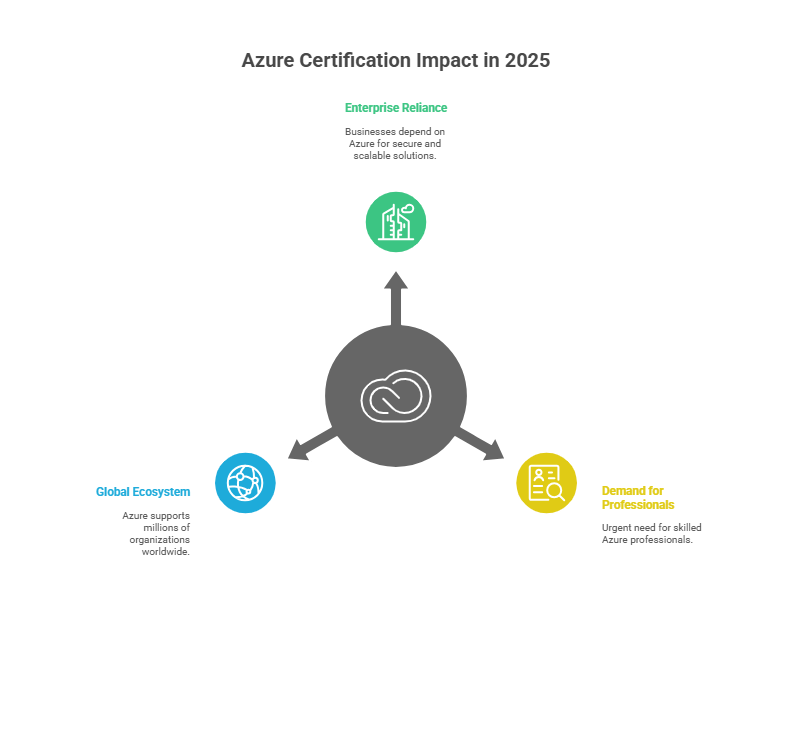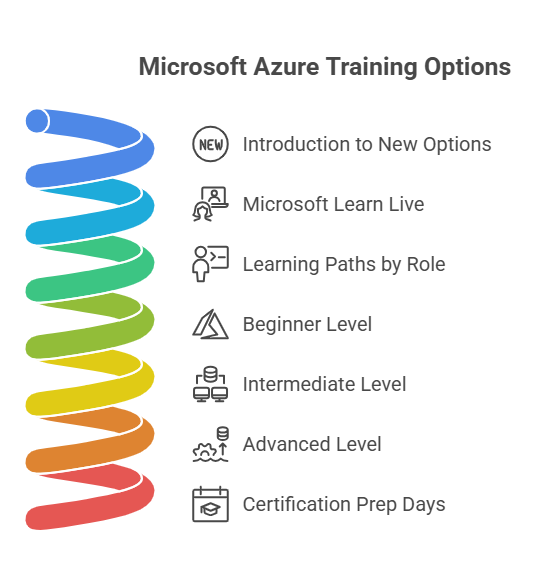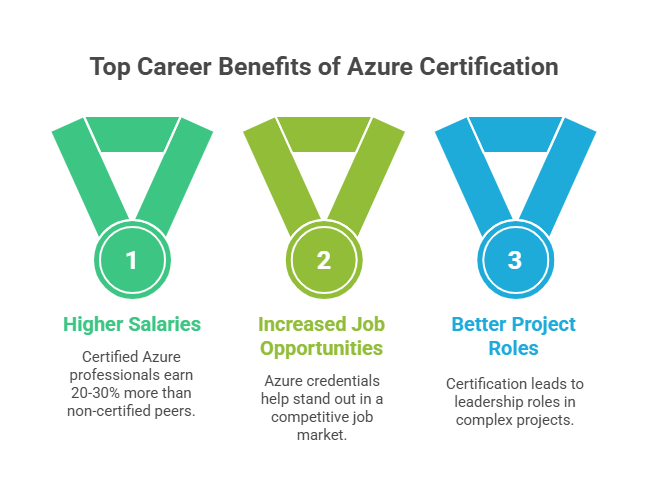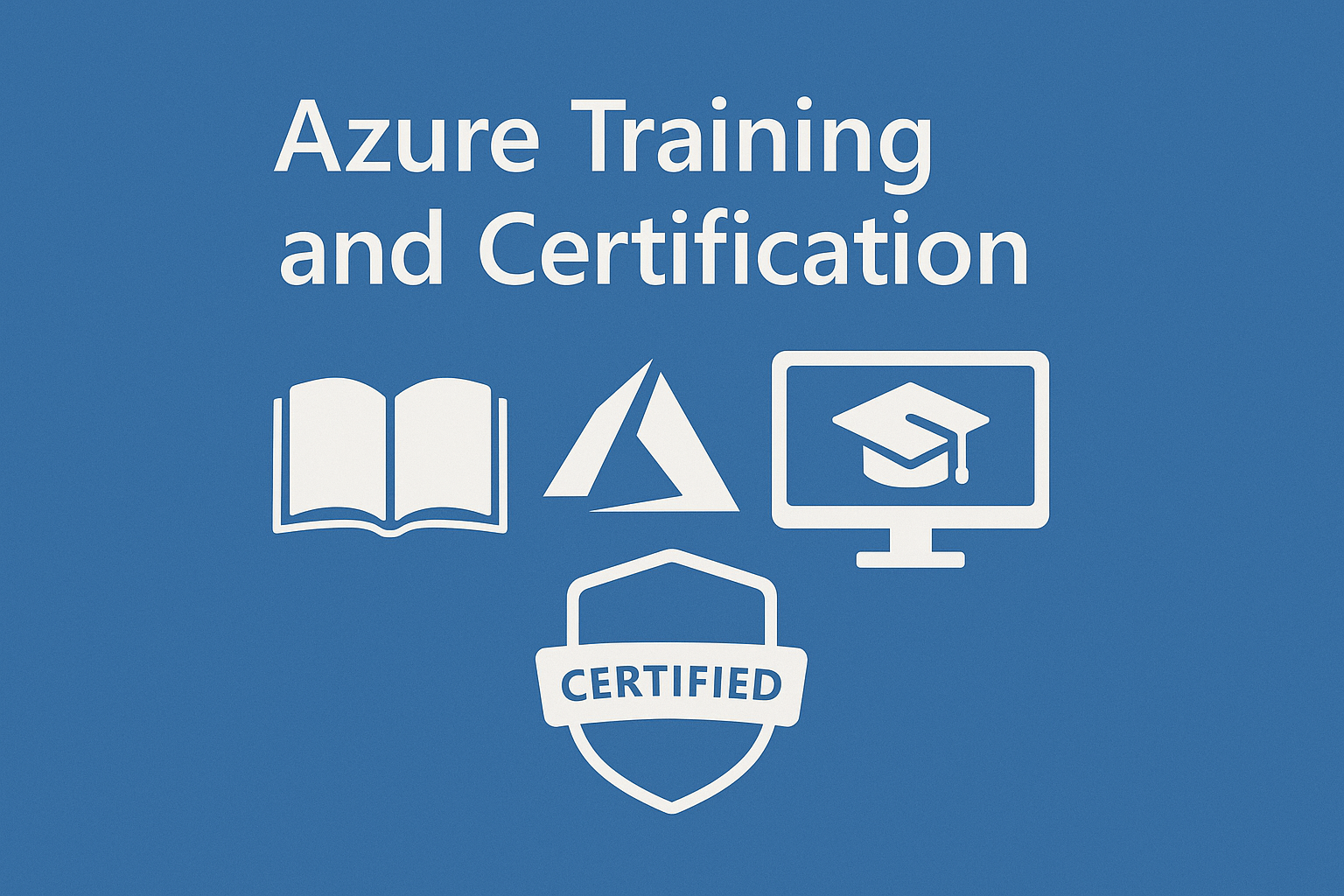The Changing Landscape of Azure Certifications
In today’s rapidly advancing digital world, cloud technology is no longer a luxury it’s a necessity. As businesses increasingly migrate their operations, data, and applications to the cloud, there is a pressing need for IT professionals who are skilled in managing and optimizing cloud environments. This is where Azure Training and Certification becomes a key enabler.
Microsoft Azure has become the backbone of cloud transformation for many enterprises, offering scalable solutions in infrastructure, security, AI, DevOps, and data analytics. To support the growing scope of Azure training and certification services, Microsoft continually updates its certification pathways to reflect modern job roles and industry needs. These changes make Azure certifications more relevant, practical, and aligned with real-world cloud applications.
Each year, Microsoft re-evaluates and refreshes its certification offerings based on emerging technologies like AI integration, edge computing, serverless architecture, hybrid environments, and sustainability-focused cloud practices. The result? A certification framework that’s more job-role centric, hands-on, and forward-looking.
In this blog, we break down the latest updates in Azure training and certification, introduce new learning paths, explain changes in certification levels, discuss pricing, and guide you in choosing the right online training resources. Whether you’re an entry-level learner or a senior IT professional, understanding these updates is essential to staying competitive in 2025 and beyond.
Why Azure Certification Still Matters in 2025
As of 2025, Microsoft azure training and certification is not just a cloud service it’s an enterprise ecosystem supporting millions of organizations around the globe. From startups to Fortune 500 companies, businesses rely on Azure for deploying secure, scalable, and intelligent digital solutions. With this growing reliance comes an urgent demand for skilled professionals who can design, implement, and manage Azure solutions effectively.

Here’s why Azure training and certification continues to be a valuable investment:
- Validates Real-World Cloud Skills: Azure certifications are designed around actual job tasks. Earning a credential means you’ve demonstrated competency in areas like identity and access management, compute resources, AI workloads, data engineering, and application development. This hands-on expertise is exactly what employers look for.
- Increases Your Chances for Promotions and Job Interviews: Certifications signal commitment and capability. Whether you’re applying for a new role or aiming for an internal promotion, a Microsoft Azure badge on your resume sets you apart from uncertified candidates.
- Demonstrates Commitment to Professional Development: Cloud technology is ever-changing. Earning and maintaining certifications shows that you’re proactive about continuous learning and adapting to new tools and trends.
- Enhances Project Delivery with Applied Cloud Knowledge: Teams led by certified professionals often experience better project outcomes due to familiarity with best practices, automation tools, and security protocols inherent to Azure services.
- Aligns You with Microsoft’s Ever-Evolving Cloud Ecosystem: Microsoft regularly updates its certifications to reflect new Azure capabilities. As a certified professional, you gain early access to these updates through training materials, beta exams, and insider communities.
- Boosts Salary and Marketability: Numerous industry surveys show that professionals with Azure certifications earn 20%–30% more on average than their uncertified peers. In competitive markets, it’s often the difference between being shortlisted and being overlooked.
- Unlocks Access to Microsoft Learning Resources: Certification paths provide access to sandbox environments, technical documentation, mentorship forums, and career tools from Microsoft giving you an edge in ongoing skill enhancement.
In summary, Azure training and certification is more than a piece of paper it’s a gateway to professional growth, better career opportunities, and future-proof cloud skills. Whether you’re just starting or expanding your cloud credentials, azure training and certification remains one of the most impactful certifications in the industry today.
1. Role-Based Certification Tracks: What’s New?
Microsoft’s shift from product-focused to role-based certifications has completely redefined how professionals learn and validate their Azure skills. This change ensures learners acquire knowledge directly aligned with actual job roles in the IT industry, from beginner to expert. In 2025, Microsoft has not only retained this model but enhanced it with updated exam content, deeper practical labs, and a focus on emerging technologies.
a. Azure Fundamentals (AZ-900)
This is the most recommended starting point for beginners or non-technical professionals. It now includes:
- AI and Machine Learning Services: Introduction to cognitive services, Azure AI, and responsible AI principles.
- Cost Management Tools: Understanding budgets, billing alerts, and Azure pricing calculators.
- Cloud Sustainability and Green Computing: Emphasizes Microsoft’s sustainability initiatives and how cloud computing reduces environmental impact.
The exam is now more scenario-driven, ensuring even newcomers understand how Azure services apply in real business contexts.
b. Azure Administrator Associate (AZ-104)
Designed for IT administrators and cloud support engineers, this certification now covers:
- PowerShell Integrations: More automation with scripted deployments and configurations.
- Azure CLI Enhancements: Latest command-line techniques for resource management.
- Role-Based Access Policies: Expanded modules on conditional access, identity governance, and Azure AD features.
It emphasizes cross-functional skills required in hybrid environments, including managing cloud-based and on-premise infrastructure.
c. Azure Developer Associate (AZ-204)
Ideal for developers who design, build, and maintain Azure applications. The updated exam now includes:
- GitHub Actions Integration: Using GitHub workflows to automate CI/CD pipelines.
- Developing and implementing applications using Docker, Kubernetes, and Azure Container Apps is known as containerised application deployment.
- API management is the process of using Azure API Gateway to design scalable APIs and Application Insights to monitor them.
Developers are now expected to work closely with DevOps and security teams, making the updated content more collaborative and project-focused.
d. Azure Solutions Architect Expert (AZ-305)
This expert-level azure training and certification now emphasizes:
- Multi-Cloud Deployments: Designing solutions that span Azure, AWS, and on-premises environments.
- Cost-Optimized Architectures: Real-world case studies focused on performance tuning and budget control.
- Security Governance: Implementing enterprise-grade policies and zero-trust security models.
This track now includes architectural labs and design challenges that replicate complex enterprise scenarios.
e. Azure AI Engineer & Data Scientist (AI-102 / DP-100)
With AI and data analytics gaining traction, these certifications have been modernized with:
- Responsible AI Frameworks: Ethics, transparency, and compliance in AI applications.
- Prompt Engineering: Using generative AI and LLMs (Large Language Models) effectively in enterprise use cases.
- Azure OpenAI Integration: Building applications that integrate with ChatGPT and GPT models using Azure’s secure environment.
Practical labs now involve real data sets, cognitive services, and full lifecycle AI model deployment.
2. New Training Options: Learning That Fits Your Schedule
To meet the growing demand for accessible and personalized cloud learning, Microsoft has upgraded its Azure training and certification online options significantly. The Microsoft Learn platform now includes:

a. Microsoft Learn Live
Live virtual sessions hosted by Azure-certified professionals. These sessions are highly interactive and allow learners to:
- Engage in real-time Q&A with trainers.
- Participate in scenario-based group challenges.
- Get demonstrations and lab walkthroughs to help you remember key ideas.
This format provides a virtual classroom feel, making learning collaborative and engaging.
b. Learning Paths by Role
Microsoft has structured its self-paced content into learning paths tailored by job role. These include:
- Beginner Level: Intro to Azure, subscription management, governance, identity.
- Intermediate Level: Storage solutions, networking, app hosting, and backup strategies.
- Advanced Level: ML workflows, DevOps strategies, Kubernetes, AI modeling.
Learners can combine modules or specialize in a particular domain. All paths feature assessments, sandbox labs, and certifications of completion.
c. Certification Prep Days
These are free, full-day online workshops designed to prepare candidates for upcoming exams. They include:
- Concept Refreshers: Recap of core modules and updated syllabus changes.
- Practice Questions: Solving mock tests with live explanation.
- Live Interaction: Clarifying doubts directly with Microsoft instructors.
These events often come with exclusive access to updated study material, making them a valuable resource for learners at all levels.
3. What Else Is Included in Modern Azure Training?
Azure training and certification today is about more than just passing exams it’s designed to build professionals who are job-ready and project-capable. Here’s what modern training programs typically include:
- Instructor-Led Classes: Delivered online or in-person, led by certified Azure experts who offer real-time feedback.
- Official Microsoft Courseware: Curriculum that is constantly updated to reflect the latest Azure services, tools, and architecture standards.
- Practical Labs and Simulated Environments: Hands-on exercises using real Azure resources that replicate enterprise scenarios.
- Mock Exams and Practice Tests: Critical tools to assess readiness and boost confidence before taking actual certification exams.
- Peer Learning and Discussion Forums: Communities of learners engaging in Q&A, project reviews, and best-practice sharing.
Additionally, some advanced programmes provide career support services like:
- Resume and portfolio building
- LinkedIn profile optimization
- Mock technical interviews
- Job placement assistance
These value-added services help ensure that learners don’t just earn credentials they turn them into career advancement.
4. What’s Retired or Replaced in 2025?
As part of Microsoft’s annual certification roadmap review, outdated or redundant certifications are regularly retired to maintain the relevance and effectiveness of its learning ecosystem. In 2025, Microsoft has taken significant steps to simplify its Azure training and certification pathways and align them more closely with evolving job roles and technologies.
Here are the major changes to note:
- The Azure Architect Design & Technologies: (AZ-303 and AZ-304) tests have been completely retired and combined into AZ-305: Azure Solutions Architect Expert, a more simplified expert-level certification. Because of this unification, there is less redundancy and more emphasis on multi-cloud architecture and practical solution-building.
- DP-100 (Azure Data Scientist Associate): The exam has been refreshed with new emphasis on real-time analytics, integration with Azure Synapse, and ML lifecycle management. Expect more hands-on assessments in predictive modeling and responsible AI.
- Azure Stack Hub and other product-based certifications: These are being phased out as Microsoft transitions toward hybrid and role-based certifications. The focus is now on roles that span both on-premises and cloud responsibilities, reflecting today’s hybrid work environments.
To stay updated, learners should regularly visit the Microsoft Learn azure training and certification dashboard, where all exam retirements, replacements, and content refresh dates are announced.
5. Popular Azure Certifications for 2025
With cloud adoption continuing to grow across all sectors, Azure training and certification are becoming an industry standard for IT professionals. Here are the most sought-after certifications in 2025, categorized by job role:
| Certification | Code | Target Role |
|---|---|---|
| Azure Fundamentals | AZ-900 | Beginners, Students, Entry-Level Professionals |
| Azure Administrator Associate | AZ-104 | IT Admins, Cloud Support Roles |
| Azure Developer Associate | AZ-204 | Backend Developers, API Integrators |
| Azure Solutions Architect Expert | AZ-305 | Solution Architects, Project Leads |
| Azure AI Engineer Associate | AI-102 | AI/ML Engineers, Data Scientists |
| Azure Data Scientist Associate | DP-100 | Data Analysts, BI Developers |
| Azure Security Engineer Associate | AZ-500 | Cybersecurity & Risk Management Professionals |
These certifications are structured to align with real-world responsibilities, giving learners and employers a clear understanding of what each credential represents. Whether you’re building foundational knowledge or demonstrating deep architectural expertise, there’s a certification to support your career growth.
6. Career Impact: What Azure Training and Certification Means
Whether you’re an IT professional pivoting to cloud computing, a developer aiming to deepen your Azure expertise, or a business analyst stepping into a data science role, azure training and certification offers a recognized and respected pathway for career advancement.

Here are the tangible career benefits:
- Higher Salaries: Compared to their peers who are not certified, certified Azure professionals usually make 20–30% more money. Verified skill sets are highly valued by employers, particularly in roles involving cloud, AI, and DevOps.
- Increased Job Opportunities: Recruiters prioritize resumes that list relevant certifications. Azure credentials help you stand out in a crowded job market, especially for roles requiring hands-on cloud expertise.
- Better Project Roles: Certification demonstrates readiness to take on leadership or technical ownership of complex projects, leading to better assignments and higher impact roles.
- Faster Promotions: In corporate environments, certification often accelerates internal promotions and transitions into cross-functional or leadership roles.
- Access to Communities and Resources: Certified professionals get access to Microsoft learning forums, early updates, insider previews, and networking opportunities with global Azure experts.
Ultimately, azure training and certification doesn’t just validate your skills it transforms your career trajectory by signaling that you are current, capable, and committed.
7. Online vs Offline: Which Training Mode is Right for You?
As the learning landscape evolves, more professionals are choosing Azure training and certification online thanks to its flexibility, affordability, and accessibility. Here’s how the two formats compare:
| Criteria | Online Learning | Offline Training |
| Flexibility | High – Learn anytime, anywhere | Limited to physical class schedule |
| Cost Efficiency | Often more affordable | Higher due to travel, infrastructure, etc. |
| Resource Access | 24/7 access to LMS, recorded sessions | Dependent on trainer availability |
| Mentorship | Live Q&A, chat forums, digital feedback | In-person guidance and direct interaction |
| Certification Prep | Includes mock exams, labs, and forums | Focused on live practical sessions |
Which one should you choose? If you’re self-motivated, balancing a job, or prefer to learn at your own pace, online training is ideal. However, if you benefit from face-to-face interaction and immediate feedback, offline training may be more suitable.
Many learners opt for hybrid models, combining live virtual sessions with recorded content and periodic in-person bootcamps.
8. How to Choose the Right Azure Training Program
Selecting the best azure training and certification programme can be difficult with so many training providers available. Make an informed choice by following these guidelines:
- Accreditation: Verify that the supplier is a Microsoft Learning Partner for accreditation. This ensures that the information is current, official, and in line with test requirements.
- Trainer Credentials: Instructors should have both certifications and real-world Azure project experience. Look for reviews or LinkedIn profiles to verify credibility.
- Training Format: Decide between self-paced, instructor-led, or hybrid learning models. Choose one that fits your learning style and schedule.
- Hands-on Labs: Training should include practical labs that allow you to deploy, manage, and troubleshoot Azure resources in real-world environments.
- Mock Exams: Practice tests are essential to build exam confidence. Make sure your program includes full-length, scenario-based mock exams.
- Career Support: Opt for programs that include resume reviews, interview coaching, and career counselling. These extras significantly boost your post-certification success.
- Alumni Network & Reviews: Check testimonials, placement records, and alumni outcomes to gauge training quality.
Choosing the right program is as important as passing the certification. A well-rounded training provider ensures that you’re not only exam-ready but also job-ready.
Frequently Asked Questions (FAQs)
1. What is Azure Training and Certification?
Azure Training and Certification is a Microsoft-led program designed to help individuals learn and validate their skills in managing, developing, and architecting solutions using Microsoft Azure cloud services. It includes online training, hands-on labs, and certification exams based on specific job roles.
2. Which Azure certification should I start with?
Beginners should start with the AZ-900: Microsoft Azure Fundamentals certification. It provides a strong foundation in cloud concepts, Azure services, pricing, and support, making it ideal for those new to cloud computing.
3. Is Azure training and certification available online?
Yes, Azure training and certification online is widely available through Microsoft Learn and authorized training partners. You can attend live sessions, access self-paced modules, and join virtual labs without needing to attend in person.
4. How much do Azure certification tests cost?
The cost of Azure certification and training varies by level:
AZ-900 (Basics): approximately USD 99
Associate and expert level (such as AZ-104, AZ-204, and AZ-305): approximately USD 165
Students, teachers, and those participating in cloud challenge promotions may be eligible for special discounts.
5. Are Azure certifications worth it in 2025?
Absolutely. azure training and certification are highly valued by employers, especially as cloud adoption continues to grow. Certified professionals often report salary increases, more job opportunities, and faster career progression.
6. How much time does it take to get ready for an Azure certification?
Preparation time varies by azure training and certification level and experience. For AZ-900, 2–3 weeks of study may be enough. Associate and Expert-level exams typically require 4–8 weeks of consistent learning and hands-on practice.
7. Can I get a job with only an Azure certification?
Yes, many entry-level roles recognize azure training and certification as a valid credential. However, pairing certification with hands-on practice or project experience greatly improves your employability.
Conclusion: Future-Proof Your Career with Azure Training
Cloud technology is no longer optional it’s the foundation of digital transformation. Investing in Azure training and certification ensures you’re ready for the evolving demands of the industry.
Whether you’re just starting or upskilling for a leadership role, the newly updated certification paths in 2025 offer clarity, hands-on skills, and industry recognition. Explore flexible Azure training and certification online, understand the Azure training and certification cost, and commit to a learning journey that leads to lasting success.

















